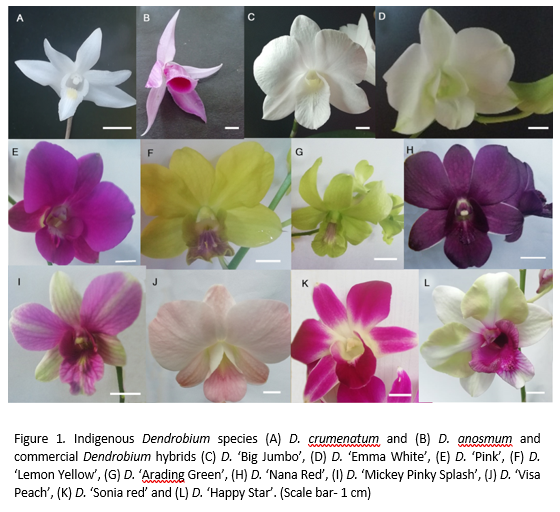|
Reproductive traits such as fruit set, pollen traits can be crucial for the development of novel hybrids in ornamental plants including dendrobiums. In the present research, pollen viability, germinability and success in seed production of two indigenous Dendrobium species and ten commercial hybrids were compared to determine if the fitness traits are compromised in commercial hybrids. The reproductive ecology of indigenous and commercial hybrids were studied by observations of visits of natural pollinators. Effect of pollen storage temperature on seasonal flowering D. crumenatum pollen viability was assessed to determine a suitable pollen storage method for the benefit of breeding programmes. Indigenous species: D. crumenatum, D. anosmurn resulted the highest pollen viability and germinability while only 40% of the commercial hybrids had viable pollen and identified as desired hybrids for successful breeding programs. D. crumenatum pollen can be stored at 90C maintaining their viability for 14 days to perform successful cross-pollination. Although all the dendrobiums tested predicted to be pollinated by bees, they failed to produce fruit set under natural pollination due to the lack of native pollinators in the suburban environment. Thus, fruit set in dendrobiums examined occurred only by hand pollination. In addition, indigenous D. crumenatum can only be used as pollen donor in cross-pollination. Overall, our results facilitate parental selection with promising features to create novel hybrids. |
 |
|
|
Weerasinghe Elena Rumalie Silva, Harshini Herath, Sena Ratnayake, Renuka Nilmini Attanayake, and Priyanganie Senanayake Journal of Pollination Ecology |
||
Abstract:- https://doi.org/10.26786/1920-7603(2023)679
|
||

- 011 2903539 / 539
- officerc@kln.ac.lk
- Mon - Fri 8:00 - 17:00
Quick Links
Contact us
Research council
University of Kelaniya, Kelaniya 11600,
Sri Lanka
+094 (112) 903 539
officerc@kln.ac.lk
Latest News
Test
